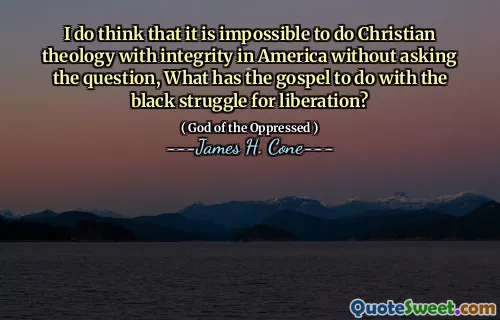"God of the Oppressed" by James H. Cone explores the relationship between God and those who are marginalized in society, particularly within the African American experience. Cone argues that God's identity is intertwined with the struggles of the oppressed, emphasizing that liberation theology must take into account the struggles faced by disenfranchised populations. This work challenges traditional notions of theology by prioritizing the voices and experiences of those who have been historically marginalized.
The book also delves into the historical context of racism and oppression, highlighting how these issues shape theological discourse. Cone critiques the established church for often siding with oppressive systems rather than supporting the fight for justice and equality. He advocates for a theology that is not only liberative but also rooted in the realities of those who suffer the most.
Ultimately, Cone calls for a re-examination of Christian doctrines through the lens of oppression, arguing that true understanding of God cannot happen without acknowledging and working against systemic injustices. "God of the Oppressed" serves as both a theological treatise and a passionate call to action for a faith that seeks to embody the principles of justice and liberation for all oppressed people.
More »
Today Birthdays
1729 -
Edmund Burke
1949 -
Haruki Murakami
1954 -
Howard Stern
1876 -
Jack London
1993 -
Zayn Malik
1951 -
Kirstie Alley
1863 -
Swami Vivekananda
1923 -
Alice Miller
1987 -
Naya Rivera
1825 -
Brooke Foss Westcott
1944 -
Joe Frazier
1951 -
Rush Limbaugh
1964 -
Jeff Bezos
1978 -
Jeremy Camp
1628 -
Charles Perrault
1856 -
John Singer Sargent
1970 -
Kaja Foglio
1953 -
Rick Santelli
1986 -
Gemma Arterton
1968 -
Raf Simons
1958 -
Christiane Amanpour
1966 -
Olivier Martinez
1996 -
Ella Henderson
1917 -
Maharishi Mahesh Yogi
1949 -
Ottmar Hitzfeld
1928 -
Ruth Brown
1968 -
Heather Mills
1946 -
George Duke
1968 -
Rachael Harris
1923 -
Ira Hayes
